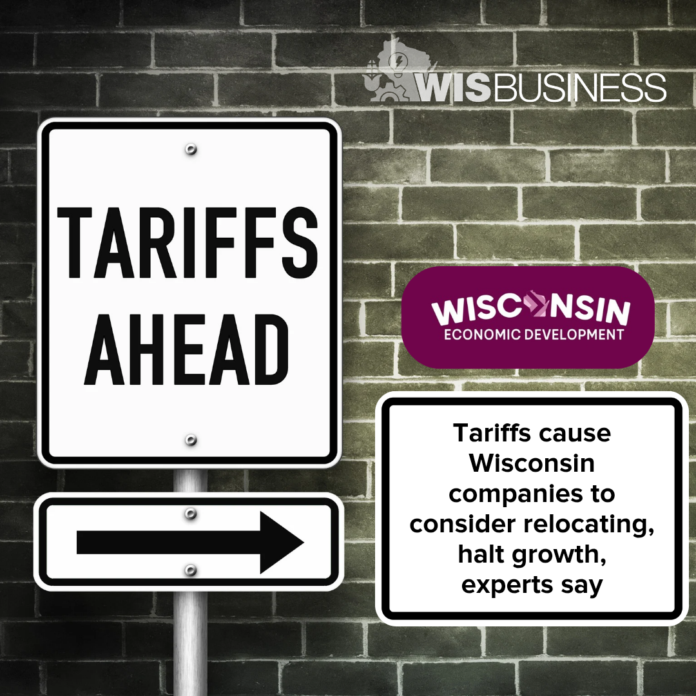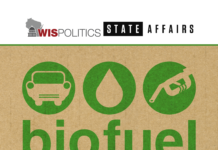The Trump administration’s tariffs are causing Wisconsin companies to look at relocating, halting growth and pursuing unadvertised government programs, a panel of experts said.
The comments came yesterday during the Wisconsin Economic Development Corporation’s annual summit in Green Bay, where a panel of three business leaders gathered to talk about unlocking opportunity and building resilience for the state’s economy. While the panelists offered a glimpse at hope for the future, much of what they had to say presented a bleak outlook.
Mike Klemp-North, vice president of Administration and Facilities at Hsu’s Ginseng Enterprises, said he tried to think about how to unlock new opportunities before starting the panel. But in the face of constantly shifting tariff prices and regulations as well as mounting costs, it was difficult.
Considering roughly 90% of the company’s products grown in Wisconsin are purchased by China, one of the biggest targets of the tariffs, “there’s only so much we can do,” Klemp-North said.
“I remember as a child … the grocery store bag said, ‘Ginseng Product of Wisconsin,’” he recalled. “If this continues, we can take that off, and we will lose that industry. I want to unlock opportunity, I do, but our relations and where we’re at, we’re not going to be able to.”
Klemp-North said the current tariff on Hsu’s products altogether is about 32-37.5%.
Jonathan Dudzinski, co-founder of women’s lip balm company Bee Bella, said the threat of “triple digit tariffs” raised sent the company “into disaster planning mode.” The company decided against launching a second product, stopped hiring and decided not to add additional manufacturing equipment “because at triple digit tariffs, our margins were negative.”
The threat of triple digit tariffs on Bee Bella products is still very real, he added.
On the positive side, Dudzinski said the company sees a bright future ahead in exports, noting the Japanese market loves his lip balm and Europe has potential buyers. He still believes the trade war could be transitory and the U.S. could either achieve its goal of bringing manufacturing home or “be so economically painful that we retreat on it.”
But he knocked the tariffs for failing to achieve the goal of bringing manufacturing back to the U.S., noting the type of bamboo Bee Bella uses in its packaging can only be sourced from China. He questioned if the goal was to bring back manufacturing: “Why do it [tariffs] on everything?”
“Because myself and for many other manufacturers, we are being squeezed by the inputs that we are bringing in stateside and then further adding value to,” he said. “But if it was done just on finished goods, then of course it would benefit a business like us.”
Christie Draves, vice president of accounting and finance at Johnson Health Tech North America, said the uncertainty of the trade war and the difficulty in navigating what tariff rates apply to the various products her company manufactures makes it difficult to keep up. She said “it almost takes a PhD in knowing tariffs to understand if you’re doing it right or not.”
She praised the company’s tariff attorney as one of the best in the world, but said she’s still looking at programs the government offers to lower tariff costs, noting Johnson’s current rate is roughly 67%.
“It all depends on the product as well,” she added. “And that’s when you start to need to network and reach out and look at other alternative programs that the federal government for sure doesn’t advertise and we don’t have a lot of knowledge about here in Wisconsin.”.
Draves didn’t expand on what the programs are, but noted her company even during the last election started looking at changing where its products are manufactured because of the threat of tariffs.
“It’s not easy, you can’t bring manufacturing here by flipping a switch,” she said. “It takes years to build a factory, it takes years to source the products that are needed.”
On a positive note, Draves said the company is taking the time to streamline more processes and look at building efficiencies into the company. One example she gave was to start using bamboo imported from China in platforms the company makes because it’s cheaper than maple.
“So it’s looking for that next international trading partner, looking for that next source of the materials,” she said.







